

The Love of Her Life. The Story of Elizabeth Bishop and Lota de Macedo Soares.
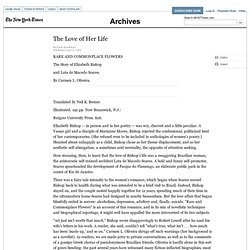
By Carmen L. Elizabeth Bishop. Elizabeth Bishop (February 8, 1911 – October 6, 1979) was an American poet and short-story writer.

She was the Poet Laureate of the United States from 1949 to 1950, the Pulitzer Prize winner for Poetry in 1956,[1] the National Book Award winner in 1970, and the recipient of the Neustadt International Prize for Literature in 1976.[2] Life and career[edit] Elizabeth Bishop - The Shampoo. Elizabeth Bishop (1911-1979) is regarded as an American poet, although by birth she was Canadian.

She was raised by her maternal grandparents after her father's early death of kidney disease when she was eight. The tragedy was followed by her mother's mental ill-health and hospitalisation in 1916 until her death in 1934. Later, she lived with her father's parents in Massachusetts and also with a much-loved aunt. These frequent changes of family and household naturally caused a sense of dislocation in the young poet and left her with a reputation of being reserved and proud. She was educated in boarding schools and in Autumn, 1930, went to Vassar College, graduating in 1937.
Rent Reaching for the Moon. Reviews Voted Most Helpful I was sad to see that this deeply moving, complex and intelligent story of the love between the award winning American poet Elizabeth Bishop and Brazilian architect Lota de Macedo Soares. was so overlooked by U.S, audiences and critics.
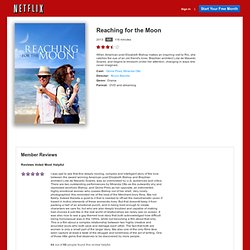
There are two outstanding performances by Miranda Otto as the outwardly shy and repressed alcoholic Bishop, and Gloria Pires as her opposite, an extroverted, highly emotional woman who coaxes Bishop out of her shell. Very nicely photographed, this reminded me of the best of the Merchant-Ivory films. Itâs not flashy. Indeed thereâs a quiet to it that is needed to off-set the melodramatic (even if based in truths) elements of these womenâs lives. 64 out of 66 people found this review helpful. What a wonderful film. 31 out of 33 people found this review helpful. This is a film of many layers, all beautifully handled by the direction, writing and acting. 21 out of 22 people found this review helpful. From the Archive: Discovering Elizabeth Bishop - Archives and Special Collections - Vassar College.
Annotated Checklist 1.
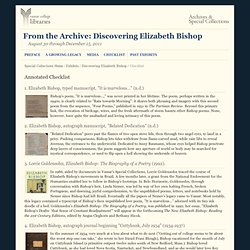
Elizabeth Bishop, typed manuscript, "It is marvelous... " (n.d.) Bishop's poem, "It is marvelous...," was never printed in her lifetime. The poem, perhaps written in the 1940s, is clearly related to "Rain towards Morning": it shares both phrasing and imagery with this second poem from the sequence, "Four Poems," published in 1951 in The Partisan Review. 2. "Belated Dedication" peers past the flames of two open stove lids, then through two angel eyes, to land in a privy. Elizabeth Bishop / Breakfast Song. Elizabeth Bishop. Biography Bishop 2. Bishop's poetry. One Art. One Art + Breakfast Song. Elizabeth Bishop The art of losing isn’t hard to master; So many things seem filled with the intent To be lost that their loss is no disaster.

Lose something every day. Accept the fluster Of lost door keys, the hour badly spent. The art of losing isn’t hard to master. Drafts. Elizabeth Bishop (1911-1979) The crisis of our lives do not come, I think, accurately dated; they crop up unexpected and out of turn, and somehow or other arrange themselves to a calendar we cannot control.”
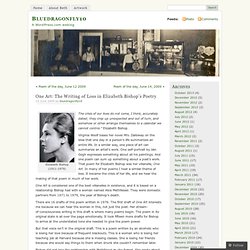
Elizabeth Bishop Virginia Woolf bases her novel Mrs. Dalloway on the idea that one day in a person’s life summarizes an entire life. In a similar way, one piece of art can summarize an artist’s work. Methfessel. I came across Elizabeth Bishop’s love poem “Breakfast Song” the very first time it was published, some twenty-three years after the poet’s death, in a December 2002 issue of The New Yorker.
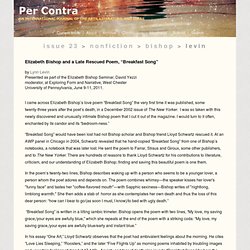
I was so taken with this newly discovered and unusually intimate Bishop poem that I cut it out of the magazine. I would turn to it often, enchanted by its candor and its “bedroom-ness.” “Breakfast Song” would have been lost had not Bishop scholar and Bishop friend Lloyd Schwartz rescued it. One Art Analysis. Methfessel + Bishop. Always reticent about her personal life, Elizabeth Bishop chose not to publish in her lifetime a poem she wrote about Alice Methfessel, a much younger woman Bishop met when she arrived in 1970 to teach at Harvard College.
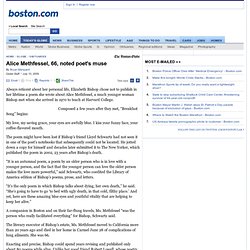
Composed a few years after they met, “Breakfast Song’’ begins: My love, my saving grace, your eyes are awfully blue. I kiss your funny face, your coffee-flavored mouth. The poem might have been lost if Bishop’s friend Lloyd Schwartz had not seen it in one of the poet’s notebooks that subsequently could not be located. He jotted down a copy for himself and decades later submitted it to The New Yorker, which published the poem in 2002, 23 years after Bishop’s death. “It is an autumnal poem, a poem by an older person who is in love with a younger person, and the fact that the younger person can love the older person makes the love more powerful,’’ said Schwartz, who coedited the Library of America edition of Bishop’s poems, prose, and letters.
“One Art’’ helped bring Ms. Ms. Bishop - Wikipedia. Elizabeth Bishop (February 8, 1911 – October 6, 1979) was an American poet and short-story writer.
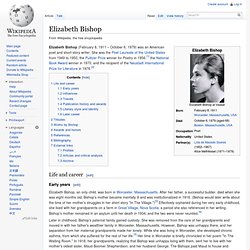
She was the Poet Laureate of the United States from 1949 to 1950, the Pulitzer Prize winner for Poetry in 1956,[1] the National Book Award winner in 1970, and the recipient of the Neustadt International Prize for Literature in 1976.[2] Life and career[edit] Early years[edit] Interview of Bishop. The interview took place at Lewis Wharf, Boston, on the afternoon of June 28, 1978, three days before Miss Bishop and two friends were to leave for North Haven, a Maine island in Penobscot Bay where she summered. Her living room, on the fourth floor of Lewis Wharf, had a spectacular view of Boston Harbor; when I arrived, she immediately took me out on the balcony to point out such Boston landmarks as Old North Church in the distance, mentioning that Old Ironsides was moored nearby. Her living room was spacious and attractive, with wide-planked polished floors, a beamed ceiling, two old brick walls, and one wall of books.
Besides some comfortable modern furniture, the room included a jacaranda rocker and other old pieces from Brazil, two paintings by Loren MacIver, a giant horse conch from Key West and a Franklin stove with firewood in a donkey pannier, also from Brazil. Her study, a smaller room down the hall, was in a state of disorder. I lived in an extremely modern house in Brazil.
Biography of Bishop. Elizabeth Bishop was an American poet and short-story writer. She was the Poet Laureate of the United States from 1949 to 1950, a Pulitzer Prize winner in 1956 and a National Book Award Winner for Poetry in 1970. Elizabeth Bishop House is an artists' retreat in Great Village, Nova Scotia dedicated to her memory. She is considered one of the most important and distinguished American poets of the 20th century. Early Years Elizabeth Bishop, an only child, was born in Worcester, Massachusetts.